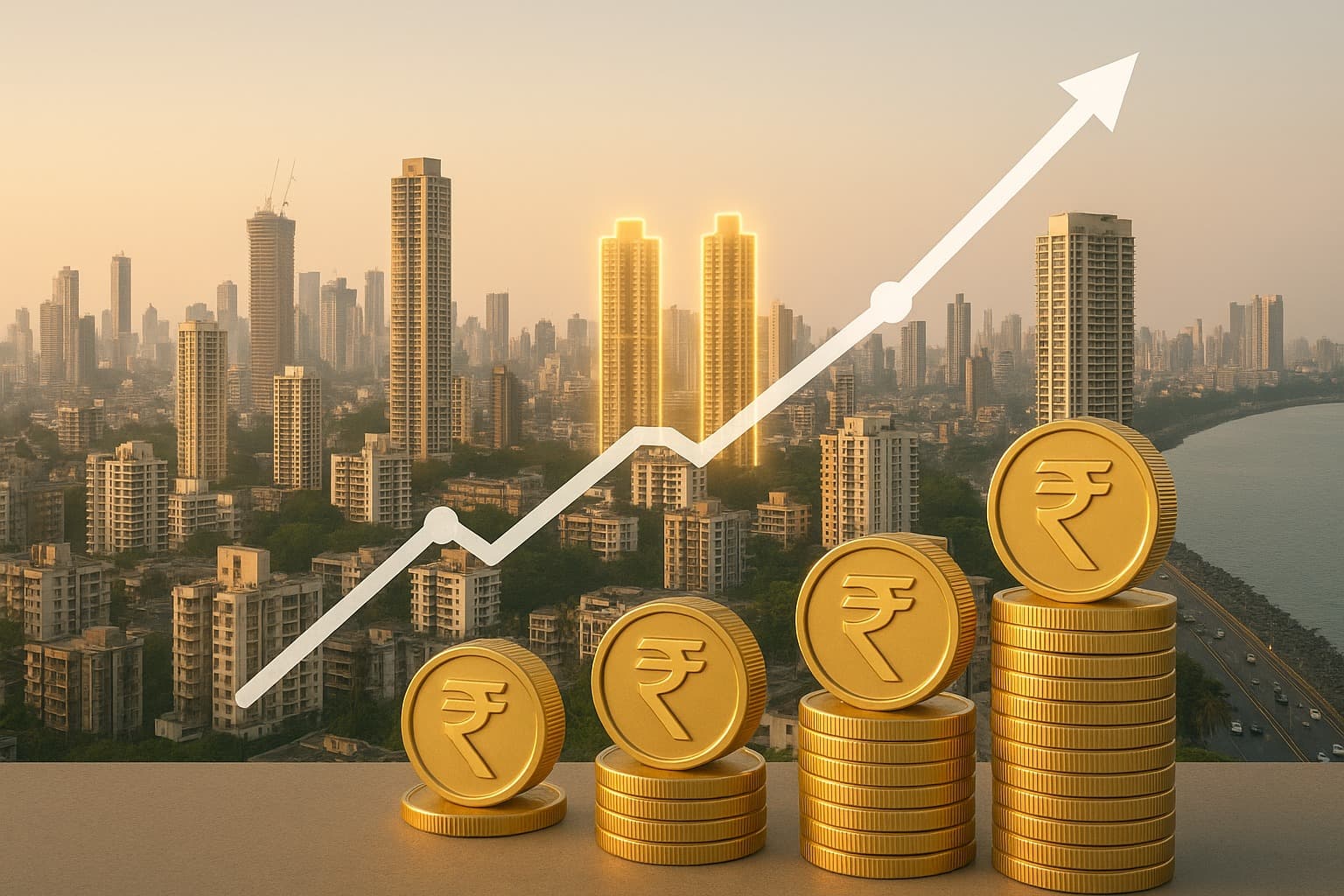Mumbai: India's Millionaire Capital - Investment Choices and Wealth Creation
Summary
Mumbai, India's millionaire capital, boasts 1.42 lakh wealthy families who favor stocks (22%) and real estate (21%) for investment. The city's financial hub status and diverse opportunities drive this concentration of wealth and strategic investment balance.

MUMBAI Leads as India’s Millionaire Capital: 1.42 Lakh Families and Their Investment Choices
Introduction: The City of Dreams That Creates Wealth
Mumbai has always had a heartbeat unlike any other city in India. From the rhythmic clatter of local trains to the glittering lights of Marine Drive, it’s a city where ambition meets opportunity. Beyond the glitz of Bollywood or the bustle of finance, Mumbai is a place where fortunes are made, and dreams often turn into reality.
Recent reports have cemented this truth: Mumbai is home to 1.42 lakh millionaire families, making it India’s undisputed millionaire capital. But wealth here isn’t just about numbers—it’s about the way people choose to grow and protect it. Stocks and real estate emerge as two favorite avenues, each telling a story of risk, trust, and aspiration.
The Numbers Behind Mumbai’s Millionaires
The wealth report highlights something remarkable. Out of the 1.42 lakh millionaire families in Mumbai:
22% have a preference for stocks, investing in equities, mutual funds, and shares of growing companies.
21% lean towards real estate, purchasing residential flats, commercial offices, and high-value properties.
On the surface, it looks like a simple statistic. But dig deeper, and it reveals the mindset of Mumbai’s elite: a balance between modern risk-taking and traditional security, between ambition and a desire to leave a tangible legacy.
Why Mumbai? The Magnet for Millionaires
Mumbai’s dominance as India’s millionaire hub is not by chance. There are reasons—both practical and emotional—that make this city a magnet for wealth:
Financial Nerve Center – With the Bombay Stock Exchange, National Stock Exchange, and headquarters of banks and corporations, Mumbai is where money flows fastest.
Opportunities Across Industries – Bollywood, IT, media, startups, and international trade—all converge here. The city offers multiple avenues to build wealth.

Global Connectivity – Mumbai is India’s gateway to the world, attracting both foreign investments and domestic entrepreneurs.
It’s a city where ambition is matched by possibility, and for millionaires, it’s the perfect ecosystem to both earn and invest.
Stocks: Riding the Wave of Modern Ambition
For 22% of millionaire families, the stock market is more than just numbers—it’s a pulse of the economy and a reflection of Mumbai’s entrepreneurial spirit. The thrill of investing in equities, watching companies grow, and reaping returns captures the risk-taking energy of the city’s elite.
Stocks represent ambition, speed, and adaptability. They allow millionaire families to stay ahead in a rapidly changing economy. For many, equity is not just investment—it’s participation in India’s growth story. In a city like Mumbai, where people are constantly chasing the next opportunity, stocks feel almost like a natural extension of their mindset: calculated risk with the potential for high reward.
Real Estate: The Timeless Security
While stocks reflect ambition, 21% of Mumbai’s millionaire families turn to real estate for stability. Mumbai’s property market, with its soaring demand and limited supply, has always been a stronghold for the wealthy. Owning a high-rise apartment in South Mumbai, a sea-facing bungalow, or even a commercial office isn’t just an investment—it’s a statement.
Property is tangible, visible, and enduring. It offers security against market fluctuations and ensures a lasting legacy for future generations. Real estate investments, especially in Mumbai, carry a sense of pride and permanence that stocks cannot match. They are a reflection of a city’s culture: the blend of progress with deep-rooted values.
The Human Side of Wealth in Mumbai
Numbers and percentages are one thing, but the human stories behind Mumbai’s millionaire families are even more captivating. There’s the first-generation entrepreneur who built a business from scratch, the Bollywood producerturning hits into profits, the tech innovator whose startup became a unicorn, and the family that bought a modest apartment decades ago, only to see its value skyrocket.

These stories reveal resilience, ambition, and the relentless spirit that Mumbai nurtures. Millionaire families here are not just wealthy—they are a reflection of the city itself: dynamic, persistent, and forward-looking.
Balancing Risk and Stability
What makes Mumbai’s millionaire investment pattern so interesting is the balance between stocks and real estate. On one side, families embrace growth-oriented equity markets, riding trends and innovation. On the other, they invest in real estate—a slower, steadier, and safer route.
This dual approach is both practical and psychological. It ensures that wealth grows while remaining anchored in something tangible. Stocks satisfy ambition and modern financial strategies, while property satisfies a sense of security, permanence, and pride.
Mumbai’s Millionaires: A Broader Reflection of India
Mumbai’s wealth concentration also reflects India’s economic evolution. The country’s GDP growth, entrepreneurial culture, and rising global presence have created more millionaires than ever before. Mumbai, with its infrastructure, financial services, and cultural magnetism, simply sits at the intersection of opportunity and ambition.
As more families enter the millionaire bracket, their investment choices—whether in equities or real estate—will influence market trends. Mumbai, thus, doesn’t just house millionaires; it sets the tone for India’s wealth distribution and investment culture.
Looking Ahead: Will Real Estate or Stocks Lead the Way?
One question lingers: as wealth grows, which will dominate—stocks or real estate? Historically, Indians have favored property for its reliability. However, equities have surged as India’s markets modernize, offering impressive returns.
The future may lie in a strategic blend. Mumbai’s millionaire families seem to understand this instinctively. Stocks satisfy growth, risk-taking, and adaptability. Real estate offers security, legacy, and pride. Together, they create a robust portfolio that balances excitement with stability—a pattern that is likely to continue.
Conclusion: Mumbai, The City That Creates Wealth
Mumbai is more than India’s financial hub—it’s a city that creates millionaires. With 1.42 lakh millionaire familiesand their carefully balanced investments in stocks and real estate, Mumbai demonstrates how ambition, opportunity, and smart financial planning converge.
The story isn’t just about money; it’s about the human spirit, resilience, and the city’s ability to turn dreams into tangible success. Stocks and real estate are merely tools—what truly matters is the vision, patience, and courage of the people who make Mumbai a home for millionaires. In the end, the city thrives because of them, and they thrive because of the city.
100-Word Summary
Mumbai is India’s millionaire capital, home to 1.42 lakh millionaire families, according to a recent wealth report. Among their investments, 22% prefer stocks for growth and equity market participation, while 21% choose real estate for security, stability, and legacy. The city’s unique combination of financial hubs, business opportunities, and cultural magnetism explains this concentration of wealth. Millionaire families in Mumbai balance ambition with prudence, investing in both fast-moving equities and enduring property. Their choices reflect not just financial strategy, but the city’s spirit—dynamic, resilient, and forward-looking. Mumbai remains a symbol of wealth, dreams, and human tenacity.
